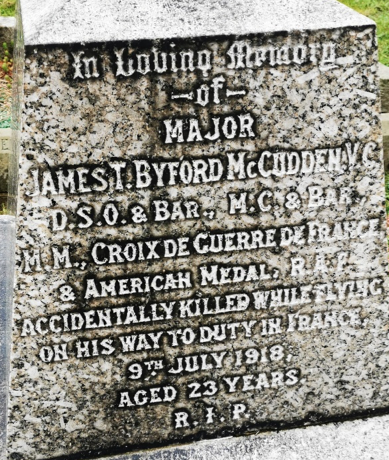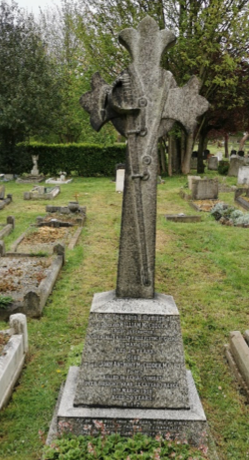Legends of Aviation # 11: Major James McCudden
- David George, CEO
- Jul 17, 2020
- 4 min read
Updated: Nov 6, 2020

During the recent lockdown, on a walk through a cemetery near my home in Kent, I noticed a memorial which told a story of family tragedy including three brothers – William, James and John McCudden, all killed in separate air incidents during the First World War.
The second son, James had a particularly remarkable career. Born in Gillingham in 1895, he joined the Royal Engineers aged 15 and transferred to the Royal Flying Corps in 1913 as a mechanic, posted to Farnborough. Here he managed to get some experience flying Bleriot monoplanes as well as gaining promotion as Air Mechanic First Class, shortly before the outbreak of the war.
Following the German invasion of Belgium, war was declared and James was sent to France as mechanic and then flew as an observer, checking out the German positions at the battles of Mons, Marne, Aisne and 1st Ypres. On 1 April 1915, he was promoted to Sergeant and made NCO in charge of all engines in his squadron. However his real enthusiasm was for flight. He became an aerial gunner prior to pilot training and in January 1916 was awarded the Croix de Guerre for gallantry by the French General Joffre. From February to June 1916, James was back England in full time pilot training, returning to France in July as a fighter pilot flying Airco DH2. By the following March he had shot down five enemy planes and was awarded the Military Cross.
The beginning of 1917 witnessed an enormous expansion of the Royal Flying Corps, and experienced tutors were required to train the mass of new students, so James returned to England as an instructor. He also learned to fly a Bristol Scout and Sopwith Pup, and flew defensive patrols over London against the threat of the German Gotha bombers. In August, he joined 56 squadron, equipped with Royal Aircraft Factory SE5 fighters and in the following six months shot down a further 52 German aircraft. He also brought to the squadron a level of technical knowledge which enhanced the reliability of the aircraft thereby saving more lives.

Typical of many fighter pilots of those days, James had great respect for some of his opponents. On the day he shot down a Fokker triplane flown by the German, Werner Voss, he wrote: “As long as I live I shall never forget my admiration for that German pilot. His flying was wonderful, his courage magnificent, and in my opinion he was the bravest German airman whom it has been my privilege to see fight”. He had utter contempt for some of the less gallant Germans however.
From September to November 1917 James shot down 10 German aircraft and was awarded the Bar to his Military Cross. Another 14 enemies bit the dust in December and he received the Distinguished Service Order. Nine more Germans were shot down by him in January and eleven in February 1918, including four in one day. The constant pressure of aerial battle was taking its toll however. James began to suffer from combat fatigue and returned home to England. A month later he had been promoted to Major and received the Victoria Cross, the highest award for gallantry, from King George V at Buckingham Palace.
James remained in England until July 1918. He wrote a book - a memoir entitled “Five years in the Royal Flying Corps”, and then was given command of a new squadron. He collected a new S.E.5a aircraft in Farnborough before returning to France on the 9th. After a stop at Auxi-le-Château, he took off for Boffles Aerodrome, but within two minutes his engine failed and the plane plunged into the ground. James had not worn his safety belt, fractured his skull and died later that evening.
The McCudden Family Memorial in Chatham Cemetery.
The death of James McCudden, aged 23, was the fourth tragedy the family had endured during the war. His eldest brother William, 24, a pilot instructor, was killed in an air accident in May 1915, and in the same month brother-in-law Arthur Spears died as a result of an explosion on the ill-fated HMS Princess Irene. In March 1918 the third brother, John, also a fighter pilot, was killed in action in France, aged only 20. The family’s suffering continued after the end of the war – the father, William Snr., was killed after being hit by a train at Clapham Junction Station and youngest brother Maurice, 33, who had served as a RAF pilot, retired through a terminal illness and died in 1934. All are commemorated on the memorial in Chatham Cemetery.
In 2018, On the 100th anniversary of the awarding of Major James McCudden’s Victoria Cross, two new memorials were unveiled. One is at the Royal Engineers Museum in Gillingham, where his medals can also be seen, and the other at Sheerness War Memorial. In recent years, numerous events in his honour have taken in place in Kent and in France where he is buried. The book “Five years in the Royal Flying Corps” (later published as “Flying Fury”) is available online.


























